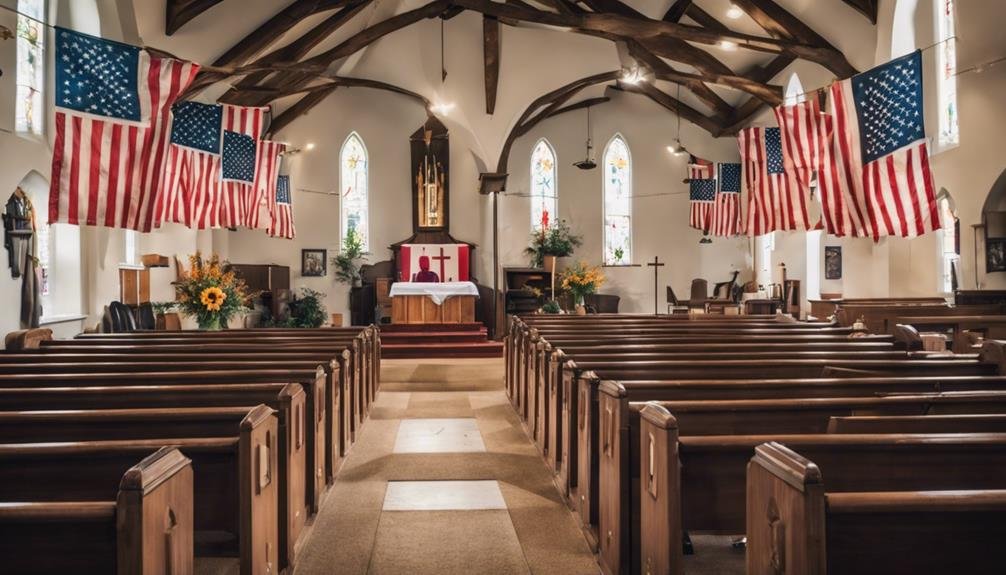When you encounter Pentecostal and Baptist churches, you’ll notice striking differences in their beliefs and practices. Pentecostals embrace a spirited worship style, often characterized by speaking in tongues and divine healing, while Baptists prefer a more structured approach to traditional hymns. This contrast extends beyond worship to their views on church governance and spiritual gifts. Have you ever wondered how these theological distinctions shape their communities and impact their followers’ faith journeys? Let’s explore how these denominations navigate their unique paths, each with its historical roots and interpretations of Christian doctrine.
Key Takeaways
- Pentecostals emphasize spirit-led experiences and spiritual gifts, while Baptists focus on personal decisions and scriptural teachings.
- Baptists practice believers’ baptism by immersion, whereas Pentecostals emphasize the baptism of the Holy Spirit.
- Pentecostal worship is dynamic and expressive, contrasting with the structured and respectful style of Baptist worship.
- Baptist churches prioritize democratic decision-making, while Pentecostal churches may have hierarchical leadership.
- Pentecostals emphasize ongoing spiritual growth in salvation, while Baptists view salvation as a one-time event with eternal security.
Beliefs and Practices

When exploring the beliefs and practices of Pentecostals and Baptists, you’ll find distinct differences that shape their worship and spiritual experiences.
For Pentecostals, spirit-led experiences are central to their faith journey. They emphasize a direct encounter with the Holy Spirit, often through baptism, which they view as a separate, transformative event following salvation. This experience frequently includes speaking in tongues and divine healing, seen as gifts of the Spirit that enhance their vibrant worship gatherings.
In contrast, Baptists focus heavily on personal decisions. They place importance on believers’ baptism, which involves the immersion of adult believers who consciously choose to follow Christ. Before baptism, adherents must decide to accept Christ, reflecting a commitment to their faith. This approach underscores the significance of individual choice and personal conviction in their spiritual journey.
Regarding worship, Pentecostals thrive in vibrant worship settings characterized by emotionally charged services with contemporary praise songs. Instruments like guitars and drums are commonly used.
Baptists, however, prefer structured services, valuing reverence and biblical teaching. Their worship features hymns and traditional songs, typically accompanied by an organ or piano, maintaining a more orderly atmosphere.
Worship Style
Worship styles between Pentecostals and Baptists vary significantly, reflecting their distinct theological emphases. You’ll notice a dynamic, expressive worship atmosphere if you attend a Pentecostal service. Contemporary praise songs and vibrant music styles, including guitars and drums, create an emotionally charged environment. This style aims to foster a direct experience of the Holy Spirit, where congregants often engage in free expression, such as raising hands or dancing. Emotional worship is central to the Pentecostal experience, encouraging personal and communal connection with the divine.
On the other hand, Baptist worship is more structured and reverent, strongly emphasizing biblical teaching. Traditional hymns and worship songs are accompanied by organs or pianos, offering a different musical ambiance. The focus here is on the lyrical and theological depth of the hymns, promoting reflection and reverence. This approach aligns with the Baptist’s emphasis on scriptural understanding and orderly worship.
Both worship styles offer meaningful experiences but cater to different preferences. Whether you’re drawn to the expressive worship of Pentecostals or the traditional hymns of Baptists, each provides a unique way to engage with faith.
Church Governance

When examining church governance, you’ll notice significant differences between Pentecostal and Baptist traditions. Baptist churches typically adhere to a congregational form of governance, emphasizing democratic decision-making. This means the congregation plays a pivotal role in making decisions, often through voting, ensuring each member has a voice. This approach reflects the Baptist’s emphasis on the local church’s autonomy.
In contrast, Pentecostal churches often embrace a more flexible and decentralized governance model. They might incorporate Episcopal or Apostolic forms, with decisions guided by the Holy Spirit and sometimes concentrated in the hands of a few leaders. This structure can lead to a hierarchical leadership style, where pastors and key leaders hold substantial authority.
To help you visualize these differences, consider the following:
- Baptist churches prioritize congregational voting and autonomy.
- Pentecostal churches may centralize authority in a few leaders.
- Democratic decision-making is a hallmark of Baptist governance.
- Hierarchical leadership often defines Pentecostal structures.
Both traditions offer unique approaches to governance, reflecting their theological beliefs and community values. Understanding these differences helps us appreciate how each church operates and makes decisions that shape their community life.
Baptism Views
Exploring the differences in baptism views between Pentecostals and Baptists reveals significant theological distinctions.
As a Baptist, you might practice believers’ baptism by immersion, which symbolizes your faith. This act signifies your identification with Christ’s death, burial, and resurrection. It’s a public declaration emphasizing the significance of personal decisions and faith in Jesus before baptism. Baptists focus on the symbolic nature of this rite, viewing it as an outward expression of an inward transformation.
In contrast, Pentecostals hold a dual view of baptism. While they do practice water baptism, they place a significant emphasis on the baptism of the Holy Spirit. This is a distinct event from water baptism for Pentecostals, highlighting an experiential encounter with the Holy Spirit. This experience is often associated with spiritual empowerment, speaking in tongues, and receiving spiritual gifts. It’s an essential component of their faith journey, offering a more dynamic expression of their relationship with God.
Holy Spirit Perspectives

When considering Holy Spirit perspectives, you’ll notice Pentecostals focus on the baptism of the Holy Spirit as separate from conversion and emphasize spiritual gifts, such as speaking in tongues. They see these gifts as essential for ongoing empowerment and guidance in a believer’s life.
In contrast, Baptists prioritize a personal commitment to Christ before baptism, which is performed through immersion, highlighting a different understanding of spiritual empowerment.
Baptism of the Spirit
Pentecostalism’s distinct approach to the Baptism of the Holy Spirit emphasizes a direct encounter with the Holy Spirit separate from the initial conversion. This belief underscores the idea that conversion experiences and spiritual encounters are pivotal moments in a believer’s life. Pentecostals view this baptism as transformative, empowering individuals with a deeper spiritual connection.
In contrast, Baptists emphasize a different understanding of the Holy Spirit’s work. For Baptists, the focus remains on the authority of Scripture and the practice of believers’ baptism as a public declaration of faith. This act represents a personal commitment to the Scripture rather than a separate, mystical experience.
To visualize these differing perspectives, consider the following:
- Pentecostals: Emphasize direct, individual encounters with the Holy Spirit, often leading to manifestations like speaking in tongues.
- Baptists: Highlight the role of Scripture and personal repentance in shaping their faith journey.
- Pentecostals: Advocate for an experiential faith, often mScripturevibrant expressions of spirituality.
- Baptists: Center their beliefs around the transformative power of prayer and a lifelong commitment to Christ.
These contrasting views illustrate the diverse ways both denominations engage with the concept of the Holy Spirit’s baptism.
Spiritual Gifts Emphasis
Understanding the role of the Holy Spirit in Pentecostal and Baptist traditions sets the stage for their differing views on spiritual gifts. For Pentecostals, the baptism of the Holy Spirit is a transformative event that emphasizes spiritual gifts such as speaking in tongues and divine healing. This belief is a hallmark of the charismatic movement and contributes to their vibrant worship style. Pentecostals often engage in emotionally charged services, prioritizing direct encounters with the Holy Spirit.
In contrast, Baptists adopt a more cautious approach towards spiritual gifts. They emphasize believers’ baptism and the personal decision to follow Christ before baptism. Their worship tends to be structured and respectful, focusing on biblical teaching and traditional hymns. The tongues controversy highlights a significant belief difference between these two groups, with Baptists generally skeptical of such manifestations.
Here’s a quick comparison:
| Pentecostals | Baptists |
|---|---|
| Emphasize spiritual gifts | Focus on believers’ baptism |
| Vibrant, emotional worship | Structured, reverent worship |
| Part of the charismatic movement | Skeptical of tongues |
The emphasis on the Holy Spirit and spiritual gifts like speaking in tongues distinctly sets Pentecostals apart from Baptists, reflecting their unique theological perspectives.
Salvation and Faith
Exploring the differences between Pentecostal and Baptist views on salvation and faith reveals distinct theological perspectives. Baptists typically believe in “eternal security,” often summarized as “once saved, always saved.” This suggests that your place in heaven is secured once you’ve truly accepted salvation through repentance and faith. As a result, your faith journey focuses on living out this assurance.
On the other hand, Pentecostals emphasize a continuous faith journey. They argue that salvation can be lost if faith isn’t actively maintained. For them, salvation involves belief, baptism, and receiving the Holy Spirit. This path requires constant repentance and spiritual growth, aiming towards a sinless life post-salvation, which isn’t necessary in Baptist doctrine.
Consider these differences in belief:
- Baptists: Salvation is a one-time event through repentance and prayer.
- Pentecostals: Salvation involves ongoing spiritual growth and renewal.
- Baptists: Eternal security is assured after accepting salvation.
- Pentecostals: Continued faith is essential to maintaining salvation.
Spiritual Gifts

When exploring spiritual gifts, Pentecostals emphasize miraculous gifts like speaking in tongues and healing as crucial to their faith experience.
In contrast, Baptists approach these gifts cautiously, focusing more on scriptural teaching and personal faith.
This fundamental difference shapes how each tradition experiences worship and the role of the Holy Spirit in their services.
Differences in Spiritual Gifts
Diving into the differences in spiritual gifts, Pentecostals and Baptists exhibit contrasting beliefs and practices. If you attend a Pentecostal service, you’ll notice a strong emphasis on spiritual gifts such as speaking in tongues, divine healing, and prophecy. These gifts are seen as a direct manifestation of the Holy Spirit’s presence. For Pentecostals, the baptism of the Holy Spirit is often accompanied by these manifestations, and there’s a significant prophecy emphasis, with many believing it plays an essential role in their faith journey.
In contrast, Baptists generally take a more cautious approach. They might acknowledge the existence of spiritual gifts but don’t prioritize or actively seek them in worship settings. This reflects a different theological perspective, where the experiential aspect of faith isn’t as highlighted.
Here’s how these differences might appear in practice:
- Pentecostal services: Expect vibrant expressions of spiritual gifts.
- Baptist services: More traditional, with a focus on Scripture and sermons.
- Divine healing: Strongly pursued in Pentecostal circles.
- Prophecy: Central to Pentecostal belief, Scripture Baptists.
These differences highlight fundamental theological variances, shaping how each denomination experiences and practices its faith.
Miraculous Gifts Emphasis
As we consider miraculous gifts, it’s clear that Pentecostals and Baptists hold distinct views.
Pentecostals emphasize the active operation of the Holy Spirit, believing in the ongoing manifestation of gifts like speaking in tongues, prophecy, and divine healing. These gifts are central to their faith practices, contributing to vibrant and experiential worship services. They see these manifestations as proof of their faith and the Holy Spirit’s presence, making each service a dynamic encounter with the divine.
On the other hand, Baptists generally approach miraculous gifts with caution. While they may acknowledge spiritual gifts, they prioritize doctrinal teaching and personal faith over actively seeking them. In Baptist faith practices, the focus tends to be on teaching the Word and traditional forms of worship, allowing for a more structured and contemplative worship experience. This doesn’t mean that Baptists deny the existence of spiritual gifts, but they often emphasize understanding and living the teachings of the Bible as paramount.
Ultimately, the differing views on gift manifestation highlight how Pentecostals and Baptists approach their worship and spiritual experiences, shaping their faith journeys.
What Are the Key Differences Between Baptists and Other Christian Denominations, Including Pentecostals?
Baptists emphasize believer’s baptism and congregational governance, distinguishing them from many other Christian denominations. While some denominations practice infant baptism, Baptists maintain that faith should precede baptism. In the discussion of baptists versus christians explained, contrasting beliefs about salvation, sacraments, and worship styles highlight their unique theological perspective.
Historical Origins
The historical origins of Baptists and Pentecostals reveal intriguing journeys of religious development. Baptists trace their roots back to 17th-century England, emerging as a group seeking religious freedom. Their foundational emphasis on believers’ baptism distinguished them from other sects, and they quickly formed distinct branches like Particular and General Baptists. This quest for a faith that allowed personal interpretation and practice was central to their growth and establishment, particularly in the early American colonies, where they became a diverse and influential denomination.
In contrast, Pentecostals have a more recent origin, springing from the late 19th and early 20th centuries. Their beginnings are closely tied to the Holiness Movement and were markedly shaped by the Azusa Street Revival. This event was pivotal in spreading the Pentecostal message, which focused on sanctification, the Baptism of the Spirit, and spiritual gifts. The Holiness-Pentecostal movement emphasized a direct and dynamic experience of faith.
Conclusion
In understanding Pentecostals and Baptists, you’ve seen how their beliefs and practices shape their identities. Pentecostals thrive on spirit-led experiences and dynamic worship, while Baptists cherish structured services and personal faith decisions. Their views on church governance, baptism, and spiritual gifts highlight their theological differences. By exploring these facets, you appreciate how each denomination’s unique historical origins influence their modern expressions of faith. Embrace these distinctions as part of Christianity’s rich diversity.
FAQs
What are the main differences between Pentecostal and Baptist beliefs?
Pentecostal and Baptist denominations share core Christian beliefs but differ in their focus and practices:
- Holy Spirit and Spiritual Gifts:
- Pentecostal: This denomination emphasizes the role of the Holy Spirit and the practice of spiritual gifts, such as speaking in tongues, prophecy, and healing.
- Baptist: Believes in the presence of the Holy Spirit but generally does not focus on practicing spiritual gifts in public worship.
- Baptism:
- Pentecostal: Believes baptism with the Holy Spirit is a separate experience from water baptism, often evidenced by speaking in tongues.
- Baptist: This denomination emphasizes water baptism as a public declaration of faith and typically does not associate it with speaking in tongues or a separate spiritual experience.
- Worship Style:
- Pentecostal: Known for lively, expressive worship with music, clapping, and spontaneous praise. Services often include moments of prophecy, healing, and testimonies.
- Baptist: This group prefers a more structured and traditional worship style, focusing on sermons, hymns, and Bible teachings without emphasizing outward expressions of spiritual gifts.
Key Differences:
- Pentecostal: Emphasizes spiritual gifts and expressive worship.
- Baptist: Focuses on traditional teachings and structured worship.
How do Pentecostals and Baptists view the Bible?
Both Pentecostal and Baptist denominations hold a high regard for the Bible as the inspired Word of God, but their interpretations and emphasis can vary:
- Pentecostal:
- Believes in continuing spiritual gifts as described in the Bible, especially those mentioned in the Book of Acts.
- Emphasizes the direct guidance of the Holy Spirit in interpreting Scripture and applying it to daily life.
- Baptist:
- It holds a more literal interpretation of the Bible and emphasizes doctrinal Scriptures rooted in Scripture.
- Believes in the infallibility of the Bible and often uses it as the sole authority in matters of faith and practScripture of the Bible:
- Pentecostal: Focuses on spiritual gifts and Holy Spirit guidance.
- Baptist: Emphasizes literal interpretation and doctrinal teachings.
What are the differences in baptism practices between Pentecostals and Baptists?
The practice of baptism is central to both Pentecostal and Baptist beliefs but is approached differently:
- Pentecostal:
- Practices both water baptism and baptism in the Holy Spirit.
- Water baptism is seen as a sign of faith, while the baptism of the Holy Spirit is an experience often accompanied by speaking in tongues as evidence.
- Baptist:
- Focuses primarily on water baptism by full immersion as a public declaration of faith in Jesus Christ.
- It does not generally emphasize speaking in tongues or view it as a necessary sign of spiritual baptism.
Baptism Practices:
- Pentecostal: Includes water baptism and Holy Spirit baptism with tongues.
- Baptist: Focuses solely on water baptism as a declaration of faith.
How do worship styles differ between Pentecostal and Baptist churches?
The worship styles in Pentecostal and Baptist churches vary significantly, reflecting their beliefs and traditions:
- Pentecostal Worship:
- They are known for lively, spontaneous worship that includes singing, dancing, clapping, and speaking in tongues.
- Services often feature prophecy, healing, and expressions of spiritual gifts as integral parts of worship.
- Baptist Worship:
- It tends to be more reserved and traditional, focusing on hymns, Bible readings, and sermons.
- Worship is structured and does not usually involve speaking in tongues or other charismatic expressions.
Worship Style:
- Pentecostal: Energetic, spontaneous, and charismatic.
- Baptist: Traditional, structured, and sermon-focused.
Do Pentecostals and Baptists share the same beliefs about salvation?
Both denominations believe in salvation through faith in Jesus Christ, but their emphasis on the process and experiences can differ:
- Pentecostal:
- Emphasizes a personal experience with the Holy Spirit as part of the salvation process.
- Believes baptism in the Holy Spirit empowers believers to live holy lives and witness effectively.
- Baptist:
- Focuses on faith in Jesus Christ as the only requirement for salvation.
- Views baptism and other practices as important but not necessary for salvation, emphasizing the doctrine of “once saved, always saved.”
Salvation Beliefs:
- Pentecostal: Emphasizes the Holy Spirit’s role in empowering believers.
- Baptist: Focuses on faith in Jesus alone for salvation.

